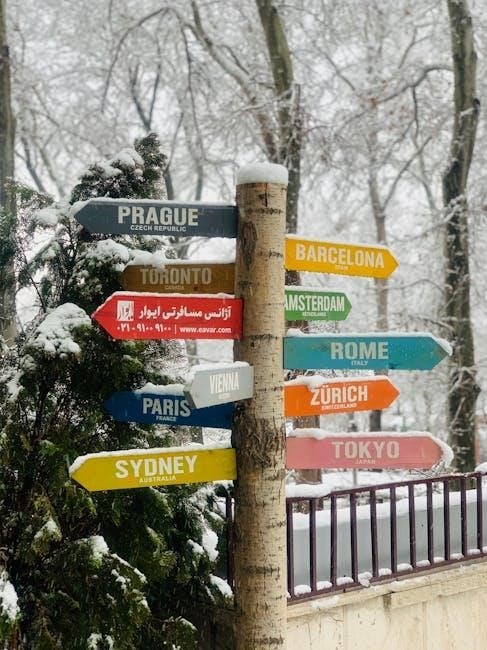This guide challenges traditional narratives‚ offering a critical perspective on Hawaii beyond tourism․ It combines art‚ stories‚ and scholarship to explore colonial impacts and cultural resilience․
Purpose and Approach of the Guide
Detours: A Decolonial Guide to Hawaii aims to decolonize perceptions of Hawaii by moving beyond tourist fantasies․ It redirects the gaze from exotic clichés to the lived realities of Native Hawaiians‚ emphasizing the impact of colonialism‚ tourism‚ and environmental degradation․ Through art‚ literature‚ and critical essays‚ the guide offers an alternative narrative‚ encouraging ethical engagement and deeper understanding of Hawaii’s history‚ culture‚ and ongoing struggles․
Editors and Contributors
Edited by Hōkūlani K․ Aikau and Vernadette Vicuña Gonzalez‚ Detours features contributions from Native Hawaiian scholars‚ artists‚ activists‚ and cultural practitioners․ Their diverse perspectives provide a comprehensive and authentic voice‚ blending academic rigor with personal narratives to challenge colonial myths and offer a nuanced understanding of Hawaii’s complex cultural and political landscape․
The Fantasy of Hawaii: A Postcard Imaginary
Hawaii is often imagined as a tropical paradise of sun‚ surf‚ and luaus‚ masking the struggles of Native Hawaiians under colonialism and tourism-driven exploitation․
Historical Roots of the Tropical Paradise Narrative
The tropical paradise narrative traces back to Captain Cook’s arrival and colonialism‚ perpetuated by missionaries and tourism․ This imagery hides Hawaii’s complex history of displacement and cultural erasure‚ reducing it to a tourist fantasy․ The guide reveals how this narrative overlooks Native Hawaiian struggles‚ including land loss‚ food insecurity‚ and military occupation‚ offering a critical lens to challenge these perceptions․
Impact of Tourism on Native Hawaiians
Tourism has deeply exploited Native Hawaiian culture‚ land‚ and resources‚ perpetuating colonial legacies․ It fosters cultural erasure‚ environmental degradation‚ and economic inequality․ The guide highlights how tourism commodifies Hawaiian traditions‚ displaces communities‚ and exacerbates food insecurity and high living costs․ By exposing these harms‚ Detours advocates for ethical practices that prioritize indigenous well-being and sustainable engagement with Hawaii’s ecosystems and cultures․
Decolonizing Travel in Hawaii
This guide challenges colonial narratives‚ promoting ethical tourism that supports Native Hawaiian communities and sustainable practices‚ fostering deeper cultural understanding and respect․
Critique of Traditional Travel Guides
Traditional travel guides often perpetuate Hawaii’s fantasy as a tropical paradise‚ ignoring its colonial history and Native Hawaiian struggles․ They focus on tourist attractions‚ beaches‚ and resorts‚ disconnecting visitors from the islands’ complex realities․ Detours challenges this by offering alternative narratives that highlight the impacts of tourism‚ military occupation‚ and colonialism‚ urging travelers to engage more deeply with Hawaii’s history and culture․
Redirecting the Tourist Gaze
Detours shifts the focus from Hawaii as a passive tourist destination to a space of active cultural and political engagement․ By showcasing art‚ literature‚ and local narratives‚ it challenges visitors to see beyond the postcard imagery․ This approach encourages travelers to engage with the islands’ history‚ environmental struggles‚ and Native Hawaiian resistance‚ fostering a more ethical and informed tourism practice․
Hawaii’s History of Colonialism and Resistance

Hawaii’s history reveals a legacy of colonialism‚ from Captain Cook’s arrival to modern struggles‚ highlighting Native Hawaiian resistance against military occupation‚ tourism impacts‚ and cultural erasure․
From Captain Cook to Modern-Day Implications
Captain Cook’s arrival in 1778 marked the beginning of Hawaii’s colonial history‚ leading to the displacement of Native Hawaiians and the exploitation of resources․ The arrival of missionaries and subsequent U․S․ involvement further entrenched colonial rule‚ culminating in the overthrow of the Kingdom of Hawaii in 1893․ Today‚ the legacy of colonialism is evident in land appropriation‚ cultural erasure‚ and ongoing struggles for sovereignty‚ highlighting the need to address historical injustices in modern contexts․
Native Hawaiian Struggles and Activism
Native Hawaiians have long resisted colonial domination‚ from the overthrow of the Kingdom of Hawaii to modern-day land struggles․ Activism today focuses on sovereignty‚ cultural preservation‚ and environmental justice․ Efforts to reclaim ancestral lands‚ revitalize the Hawaiian language‚ and challenge military occupation highlight the ongoing fight for self-determination․ These struggles reflect a resilient spirit and a commitment to honoring Hawaiʻi’s rich cultural heritage in the face of historical and contemporary injustices․
Art‚ Literature‚ and Maps as Decolonial Tools
This section explores how art‚ literature‚ and maps challenge colonial narratives․ By reframing Hawaii’s history and culture‚ these tools inspire creativity and activism‚ effectively reclaiming narratives and spaces with indigenous perspectives․
Using Art to Challenge Colonial Narratives

Artists and writers in Detours employ their work to dismantle stereotypes and reclaim Hawaiian identity․ Through visual and literary expressions‚ they highlight indigenous struggles‚ histories‚ and resilience‚ offering counter-narratives to colonial myths․ These creative contributions amplify Native Hawaiian voices‚ fostering deeper understanding and solidarity․ By centering local perspectives‚ art becomes a powerful tool for decolonization‚ inspiring tourists to engage ethically and mindfully with Hawaii’s culture and environment․
Maps and Tour Itineraries as Political Statements
Detours reimagines Hawaii through alternative maps and itineraries that challenge colonial representations․ These tools redirect tourists away from exploitative sites‚ emphasizing indigenous histories and landscapes․ By embedding Native Hawaiian knowledge‚ the guide transforms travel into a political act‚ urging visitors to engage with the islands ethically and respectfully․ This approach decolonizes space‚ reclaiming Hawaii’s narrative from tourism’s gaze and fostering deeper connections to its people and land․
Environmental and Climate Challenges
Hawaii faces significant environmental issues‚ including climate change‚ food insecurity‚ and high living costs‚ exacerbated by tourism and colonial legacies․ This section examines these challenges critically․
Climate Change and Food Insecurity

Climate change exacerbates Hawaii’s environmental struggles‚ with rising temperatures and sea-level rise threatening agriculture and marine ecosystems․ Historical colonial practices disrupted traditional farming‚ deepening food insecurity․ This section explores these challenges‚ emphasizing the need for sustainable‚ decolonial solutions to restore balance and ensure food sovereignty for Native Hawaiians․
Military Occupation and Land Use
Hawaii’s history of military occupation has profoundly shaped its land use‚ displacing Native Hawaiians and prioritizing strategic interests over cultural preservation․ U․S․ military bases occupy vast areas‚ disrupting ecosystems and communities․ This section examines the legacy of colonial land grabs and ongoing resistance‚ highlighting the tension between military expansion and Native Hawaiian sovereignty․ It underscores the need for decolonial approaches to land stewardship and justice․
Cultural Revitalization and Community Engagement
This section explores the resurgence of Native Hawaiian traditions‚ language‚ and community-driven initiatives‚ emphasizing collaboration between culture‚ art‚ and activism to strengthen local identity and resilience․
Reviving Indigenous Practices
Through art‚ stories‚ and scholarship‚ this section highlights efforts to reclaim and preserve Native Hawaiian traditions․ Language revitalization‚ traditional farming‚ and cultural ceremonies are central to these initiatives․ By reconnecting with ancestral knowledge‚ communities foster resilience and correct historical narratives․ These practices not only honor the past but also inspire future generations‚ ensuring a vibrant cultural identity that thrives beyond colonial influences․
Supporting Local Communities
Engaging with local businesses and initiatives fosters economic empowerment for Native Hawaiians․ Ethical tourism encourages visitors to support grassroots organizations‚ farmers‚ and artisans․ By prioritizing community-driven projects‚ travelers contribute to sustainable development and cultural preservation․ This approach ensures that resources benefit the people and lands of Hawaii‚ promoting a more equitable and regenerative tourism model that honors indigenous values and environmental stewardship․
Responsible Travel Practices
This guide emphasizes minimizing harm to Hawaiian cultures through mindful practices‚ redirecting tourism to support ethical engagement and sustainable interactions with the islands’ environment and communities․
Reducing Harm to Local Cultures
Detours: A Decolonial Guide to Hawaii emphasizes ethical tourism by encouraging travelers to engage respectfully with Native Hawaiian customs and landscapes․ By highlighting community-driven initiatives and cultural protocols‚ the guide helps visitors move beyond stereotypes‚ fostering meaningful connections while supporting local sovereignty and environmental stewardship․ This approach promotes a shift from consumption to reciprocity‚ ensuring tourism benefits both visitors and the islands’ indigenous communities․
Ethical Tourism in Hawaii
Detours advocates for tourism that prioritizes cultural sensitivity and environmental sustainability․ By centering Native Hawaiian voices‚ it encourages visitors to support local businesses and respect sacred sites․ This ethical approach challenges exploitative practices‚ fostering a deeper understanding of Hawaii’s history and ongoing struggles․ The guide emphasizes reciprocity‚ urging travelers to contribute positively to the islands’ well-being rather than treating them as a commodity․
The Significance of Detours

Detours redefines travel by challenging colonial narratives‚ offering a decolonial perspective that honors Hawaii’s history and culture‚ encouraging mindful engagement with the islands’ complex identity and resilience․
Changing Perceptions of Hawaii
Detours challenges the postcard fantasy of Hawaii‚ moving beyond tourism to explore its complex history‚ cultural richness‚ and ongoing struggles․ By amplifying Native Hawaiian voices and experiences‚ the guidebook reveals the islands’ multifaceted identity‚ encouraging readers to engage ethically and thoughtfully with the land and its people‚ fostering a deeper understanding of Hawaii’s sovereignty and resilience beyond the surface-level tropical paradise narrative․
Future Implications for Travel Guides
Detours sets a transformative precedent for travel guides‚ advocating for ethical‚ culturally sensitive storytelling․ By prioritizing indigenous voices and decolonial narratives‚ it inspires a shift in how destinations are represented‚ encouraging future guides to embrace similar critical approaches․ This model could redefine travel literature‚ fostering deeper connections between visitors and local cultures while promoting responsible tourism practices globally․ Hawaii’s story becomes a blueprint for more mindful‚ equitable travel experiences worldwide․